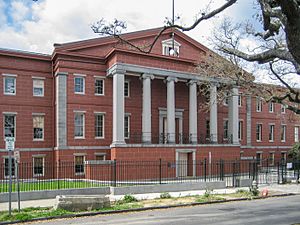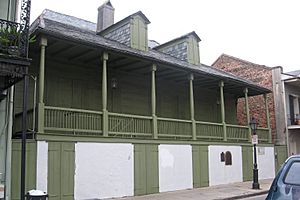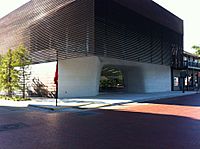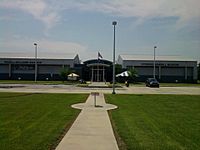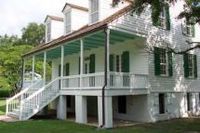Louisiana State Museum facts for kids
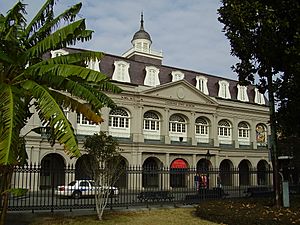
Louisiana State Museum, The Presbytere.
|
|
| Location | Louisiana |
|---|---|
The Louisiana State Museum (LSM) is a group of museums and historic buildings across Louisiana. It was started in New Orleans in 1906. These museums hold thousands of old items and artworks. They show Louisiana's rich history and its many different cultures.
Contents
- Discovering Louisiana's History
- Museum Sites in New Orleans' French Quarter
- Capitol Park Museum – Baton Rouge
- Louisiana Sports Hall of Fame & Northwest Louisiana History Museum – Natchitoches
- Wedell-Williams Aviation & Cypress Sawmill Museum – Patterson
- E. D. White Historic Site – Thibodaux
- Museum Collections
- Programs and Events
- See also
Discovering Louisiana's History
The idea for the Louisiana State Museum began at the Louisiana Purchase Exposition in 1904. This big fair was held in St. Louis, Missouri. Many important historical items were gathered to be shown at Louisiana's exhibit there. After the fair, people decided these items should be kept, added to, and displayed.
So, the Louisiana State Museum was created in 1906 to do just that. The Presbytere and the Cabildo buildings were some of the first places the museum used. These buildings are next to the St. Louis Cathedral on Jackson Square. Today, the Louisiana State Museum has thirteen properties around the state. These include historic buildings and modern museums.
For over 100 years, the Louisiana State Museum has done more than just run museums. It has also collected and protected historical items from Louisiana's past. Louisiana has been part of a French colony, a Spanish colony, and even a short-lived property of Napoleon. It then became part of the United States through the Louisiana Purchase. Finally, it became the state of Louisiana. Because of this long history, the museum's collections are very important. They help us understand state, national, and even world history.
The Louisiana State Museum also works to share the state's unique culture and history. Several new museum sites have opened in recent years. These include the Wedell-Williams Aviation & Cypress Sawmill Museum - Patterson, the Performing Arts Center at the New Orleans Mint, the Capitol Park Museum - Baton Rouge, and the Louisiana Sports Hall of Fame & Northwest Louisiana History Museum – Natchitoches.
The museum often creates new exhibits, both temporary and permanent. These exhibits highlight interesting topics from Louisiana's culture and history. The museum also hosts many programs. These include lecture series, educational tours for school groups, walking tours of historic areas, and musical performances.
Many groups across Louisiana help support the museum. Some of these are the Louisiana Museum Foundation, Friends of the Cabildo, and Friends of the Capitol Park Museum.
Museum Sites in New Orleans' French Quarter
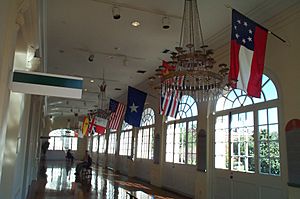
- The Cabildo - This building was Spain's old City Hall, built in 1799. It was where the two Louisiana Purchase transfers happened in 1803. First, Louisiana was transferred from Spain to France, and then from France to the U.S. The Cabildo later held government offices, including the Louisiana Supreme Court. Today, it has three floors of exhibits about Louisiana's history. It also has changing exhibits in the next-door Arsenal building.
- New Orleans Mint - This building was a United States Mint. President Andrew Jackson ordered it built in 1835. It was the only U.S. Mint to ever make coins under a flag other than the United States' flag. It briefly made coins for the Confederacy. The building also served as a federal prison and a Coast Guard base. Now, it is a Louisiana State Museum. It has a permanent exhibit about making coins. The second floor has exhibits on Louisiana music. The third floor has a Performing Arts Center and the Louisiana Historical Center.
- The Presbytère - This building was first meant to be housing for local church leaders. It was used for many things before becoming a Louisiana State Museum property in 1911. The first two floors have exhibits, and the third floor holds the State Museum offices.
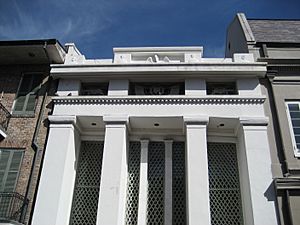
- The Arsenal - Built in 1839, the Arsenal is next to the Cabildo. It stands where an old Spanish Arsenal was built in 1762. Its first floor is a classroom for school groups. The second floor has changing exhibits, and the third floor is used for meetings. You can get to the Arsenal through the Cabildo museum.
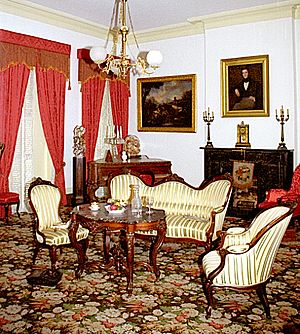
- 1850 House - This is a historic house museum in the Lower Pontalba Building. The 1850 House museum shows what middle-class family life was like in New Orleans in its most successful period. It has a fully furnished three-story apartment. The first floor has a museum gift shop.
- The Creole House - Built in 1842, this house is where the Friends of the Cabildo are located. This group supports the Louisiana State Museum's French Quarter museums.
- The Jackson House - This building is named after Andrew Jackson, a hero of the Battle of New Orleans. The original building from 1842 was rebuilt in 1936. There are no exhibits here right now.
- Madame John's Legacy - This building is historically important because it survived the Great New Orleans Fire (1794). That fire destroyed much of New Orleans. This house was actually rebuilt after an earlier fire in 1788. The buildings on this site were partly destroyed by that fire. The current building was rebuilt in the same French colonial style six months later.
Capitol Park Museum – Baton Rouge
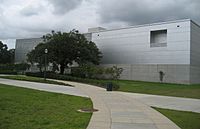
The Capitol Park Museum - Baton Rouge has exhibits about Louisiana's history, industries, and culture. The museum has two main exhibits. One is called "Grounds for Greatness: Louisiana and the Nation." The other is "Experiencing Louisiana: Discovering the Soul of America."
Louisiana Sports Hall of Fame & Northwest Louisiana History Museum – Natchitoches
The Louisiana Sports Hall of Fame & Northwest Louisiana History Museum – Natchitoches is the newest museum facility of the Louisiana State Museum. The Louisiana Sports Hall of Fame exhibit has pictures and items celebrating over 300 famous Louisiana athletes, coaches, and other sports figures.
The Northwest Louisiana History Museum explores how unique cultural traditions developed. It covers everything from early Native American groups to today.
Wedell-Williams Aviation & Cypress Sawmill Museum – Patterson
The Wedell-Williams Aviation & Cypress Sawmill Museum - Patterson is a modern building in Acadiana. The Wedell-Williams Aviation Collection focuses on two Louisiana aviation pioneers, Jimmie Wedell and Harry Williams. They started an air service in Patterson in 1928. The Patterson Cypress Sawmill Collection shows the history of the cypress lumber industry in Louisiana.
E. D. White Historic Site – Thibodaux
The E. D. White Historic Site is in Thibodaux. It is the 1800s plantation home of Edward Douglass White, Sr.. He was governor from 1835 to 1839. His son, Edward Douglass White, became a judge on the United States Supreme Court in 1894. He served as chief justice from 1910 to 1921. The E.D. White House exhibits tell the history of the region. They include sections about the Chitimacha Natives, Bayou Lafourche, early Acadian settlers, growing sugar cane, and the White family.
Museum Collections
The Louisiana State Museum has two main places where it keeps its collections in New Orleans. The main collection facility is in the French Quarter. This place holds visual arts, costumes, textiles, science, technology, and decorative arts collections.
The second facility is the Old U.S. Mint on Esplanade Avenue. This building holds the Document Archives and Jazz & Music Archives. The Mint also has the Louisiana Historical Center. This center lets people who are researching history look at the Document Archives. Besides maps and old papers, the center has sheet music, microfilms, scrapbooks, pamphlets, and newspapers.
You can visit both collection facilities by making an appointment.
Programs and Events
- Hidden Treasures: This is a lecture series where guests go behind the scenes into the Louisiana State Museum's archives in New Orleans. They get to see items related to the topic being discussed.
- 2nd Thursdays Lecture Series: This is a regular lecture series about unique topics in Louisiana's culture and history.
- Music at the Mint: The Louisiana State Museum hosts concerts of many different types of music. These include jazz, blues, and instrumental music. They happen on the third floor of the Old U.S. Mint in the Performing Arts Center.
- New Orleans Jazz National Historic Park performances and lectures: The National Park Service often hosts free music performances and lectures about the beginnings of Jazz. These happen almost daily at the Old U.S. Mint, working with the Louisiana State Museum.
- Colonial Documents Digitization Project: The Louisiana State Museum is working to make over 70,000 French and Spanish legal and official documents available and preserved. These documents are kept in the Louisiana Historical Center. The museum received a grant to turn these old records into digital files. They are creating an online database that will be free for anyone interested in learning about colonial Louisiana.
- Lunchtime Lagniappe Summer Lecture Series at Capitol Park: This is a weekly series of lectures that explores Louisiana's rich culture and history. They happen every Wednesday in March and October at the Capitol Park Museum in Baton Rouge.
- Capitol Park & Spanish Town Walking Tours: The Capitol Park Walking Tour happens on the first Saturday of April and the first Saturday of September. It teaches about the different historic parts of Capitol Park. The Spanish Town Walking Tour happens on the first Saturday in May and the first Saturday in October. It gives information about the historic Spanish Town Neighborhood.
See also
- Louisiana History Museum – Alexandria
 | Aaron Henry |
 | T. R. M. Howard |
 | Jesse Jackson |


